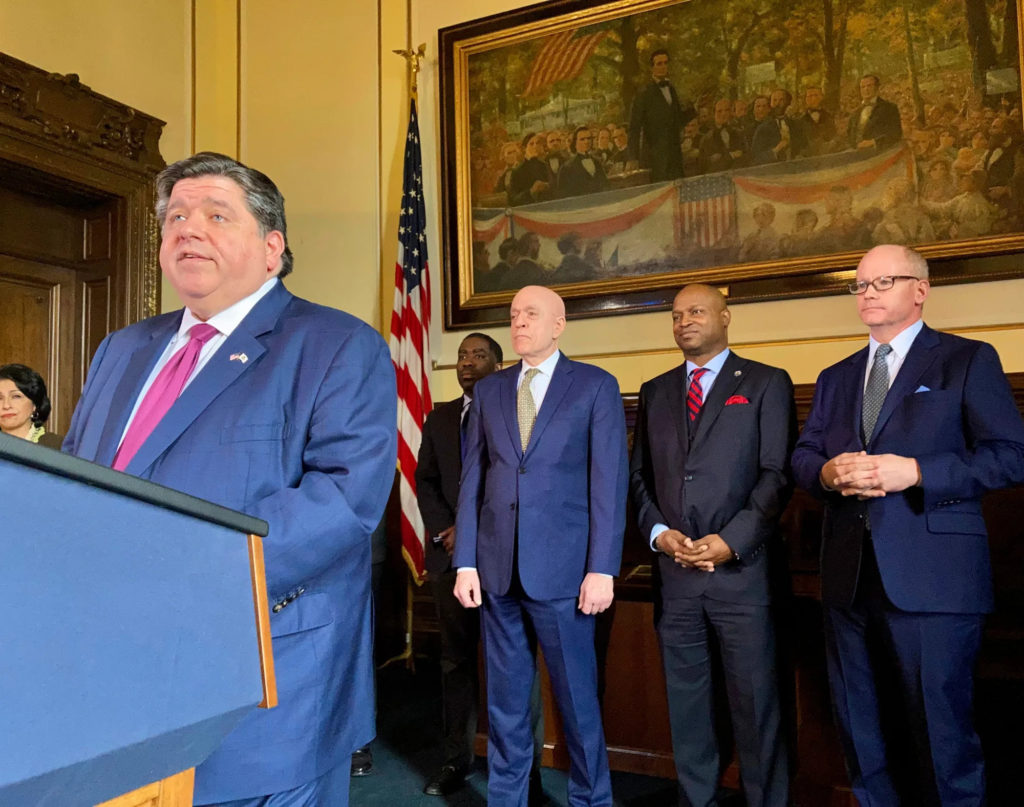
SPRINGFIELD, Ill. (AP) — A respected tax and budget watchdog on Thursday praised Gov. J.B. Pritzker’s budget proposal for cautious spending and paying bills, but took a dim view of the Democrat’s proposal to fight inflation by sparing consumers a few dollars at the gas pump.
The Civic Federation analysis of the spending plan that would take effect July 1 notes the extraordinary turnaround state tax revenues have made as the pandemic has subsided in addition to federal relief for the $45.4 billion operating budget, which it says is 3.4% lower than the $47 billion expected to be spent this year.
Civic Federation President Laurence Msall said Pritzker plans to use a sizable portion of it to pay down debt, increase reserves and push an extra $500 million into the state’s severely underfunded pension plans. The state’s overdue bills have been reduced to a normal payment schedule, $900 million in backlogged group health insurance bills will be paid, a federal loan will be paid two years early and a sizable rainy day fund will be established.
“The state is in a much stronger financial position than it has been for many years, as evidenced by two recent general obligation credit rating upgrades and its backlog of unpaid bills is the smallest it has been in many years,” the report said.
But the nonpartisan think tank frowns on one of the pieces of an election-year inflation-relief plan Pritzker has proposed. It favors most of the proposal, which includes a one-year suspension on the 1% sales tax on groceries and a one-time rebate of about $300 per homeowner on property taxes.
The other major part drawing criticism is halting a cost-of-living increase in the motor fuel tax to pay for roads, bridges and other transportation-related improvements. The gasoline tax was doubled to 38 cents a gallon in 2019, the first time in three decades, with lawmakers indexing it to inflation so it would keep up with costs. It’s now at 39.2 cents per gallon and Pritzker wants to prevent an expected 2.2-cent increase July 1.
The idea is a departure from the thoughtful and forward-looking approach to the rest of the budget, Msall said, and reneges on the index just three years after it was approved.
“The first time that inflation seems to be going up, the state says, well, we weren’t really serious,” Msall said. “The reason why gas prices are going up is not because the state of Illinois taxes gasoline. … Once it (the state) starts down a path to provide relief that it can’t afford, it is very difficult to stop.”
Transportation advocates agree. Although it would only cost the state $135 million, they say the effect would be devastating in terms of timely completion of projects. Msall said the state should identify for taxpayers the projects that would be delayed in exchange for the tax freeze.
The budget marks significant progress in eliminating debt problems that prohibit planning, Msall said, but more is necessary. For example, while a nearly $900 million rainy day fund is unprecedented, Msall said it should amount to 10% of the state’s operating budget.
“Significant long-term challenges remain that must be addressed through long-term planning,” the report said. “Without the pressure of a budget deficit and billions of dollars in unpaid bills, the state should embrace this opportunity to come up with a long-term vision for how it will maintain budgetary balance and financial stability into the future.”
